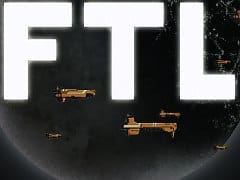Video Gamer is reader-supported. When you buy through links on our site, we may earn an affiliate commission. Prices subject to change. Learn more
Have you ever watched Battlestar Galactica and wanted control over the fleet’s faster than light travel? Have you ever played Mass Effect and yearned for ship-to-ship combat instead of cover-based shooting and dodgy romances? FTL may just be the answer to both of those questions, and I’m not the only one to think so: it’s one of the first finished products of the fan-funding Kickstarter boom that has swept the games industry.
FTL is best described as a top-down space exploration, combat, and survival simulator. You control a lone Federation cruiser, on the run from ambiguous rebels and armed with some vital information, heading back to the safety of your fleet. The game screen is dominated by the interior of your ship, split up into various systems. Engines, weapons and shields are there, along with a few less obvious sub-systems and some more exciting ones you’ll need to pick up along the way. The clean pixels of your ship and the static backgrounds combine with the calming electronic music to evoke the solitude of space.
The whole game is about spooling up your FTL drive and jumping to the next beacon, chosen from a randomised map. You’ll need to traverse across eight in all, but this is a galaxy full of friends and (mostly) foes, peaceful civilian clusters and power-sapping pirate-hiding nebulae, but you always have the same mission and the same final goal. Appear at a new beacon and you might come across an ally or a merchant, or you might have to make a life-or-death decision; whether to help a pirate’s prey, or to explore an abandoned space station. Each short, text-based scenario (which repeat, but with multiple outcomes) is thankfully well-written and dryly funny.
More often than not though, you’ll find yourself engaged in FTL’s strongest department: combat, whether against antagonistic aliens, angry rebels or merciless pirates. Every fight matters because defeat means death – there’s no restarting. Battles start with an agonising wait while your weapons charge and the ambient music becomes militarised with the bleeps and bloops of systems coming online. First you’ll need to take down the enemy shields, which only certain weapons can penetrate. Time it right and your next shot can hit their weapons systems before the shields return. Pauses in combat allow you to line up shots, while drones can be deployed to wear down defences or protect yours.
These are just the basics; fights only get more complex as you and your opponents add more powerful weapons and systems. Enemies play by the same rules you do, so they’ll take down your shields and damage your oxygen or engines, and you’ll need to repair them. Best of all, unlocking different ships can change the combat dramatically, as you’ll be with or without certain systems and equipped with different starting weapons. Unlocking new gear can be complicated, so don’t expect to have the full fleet at your disposal anytime soon.
It may be strange to say so, but you actually want to pick as many fights as you can in FTL, especially at first. The scrap you’ll get from looting a ship as it breaks apart forms the currency you’ll need to improve yours: levelling up its systems; adding power; installing more exciting weapons and drones; hiring crew members; and repairing the hull. Choosing what to upgrade is often a tricky choice between the safety of more shields and the power of some gigantic space laser.
Even on easy mode, FTL is another capital-D Difficult game and its random nature means even the most careful of explorers might find themselves unexpectedly asphyxiated. You’ll sometimes find yourself wishing you’d found that powerful missile on the same run that you had bought the Ship Defence Mk II drone. But even before you finally beat the big boss, there’s a sweet sense of progression; exotic systems to try, weapon combinations to test, and alien crew to hire. Without its difficulty, the depth of FTL’s interaction would be lost; but with the challenge, these myriad ill-fated journeys have had a massive effect on me.
Version Tested: PC
